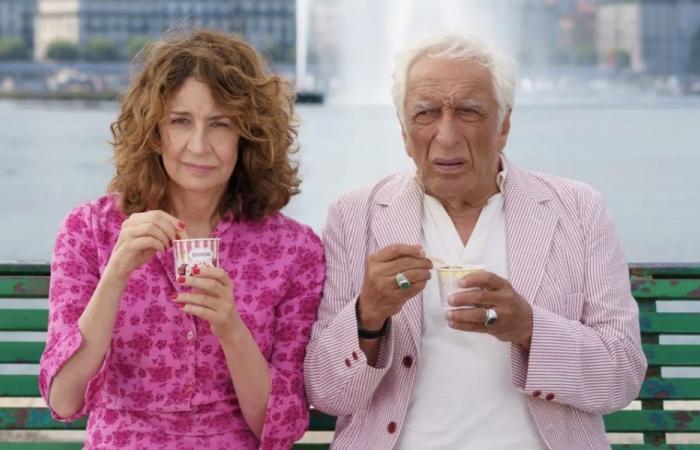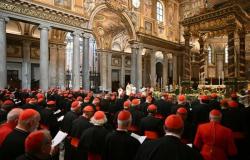The Vaudois filmmaker Lionel Baier was the guest of Double Face to mention in particular his latest film: “La Cache”, an autobiographical story by Christophe Boltanski.
Our guest, Lionel Baier, is a real jack-of-all-trades in the cinematic world. Director, screenwriter, producer, actor, teacher, and formerly projectionist. A profession he exercised at the Rex cinema in Aubonne from the age of 17. With a certificate validating its skills in this area. This is even the only title he owns, he told Valérie Ogier’s microphone. A cinema, in which he did not just project films there; He became a programmer and co-manager.
He considers himself much less titled than most of the students to whom he gives prices to the Fémis (École nationale supérieure des métiers de l’Image et du Sound in Paris) or at the Ecal (Cantonal Ecole d’Art de Lausanne), a school in which he will get involved in the management of the cinema department. Students that they envy, ultimately, to have the possibility of experimenting with the different facets of the 7th art, unlike his career where he was directly thrown into the bath and plunged into reality in particular via his production company.
From the age of 9, Lionel Baier knew he wanted to do cinema. The click occurred by watching a Hitchcock film. He tells us about the circumstances which led him to take an interest in the profession of director, and the evidence for him to embrace this profession, supported by his family passionate about culture. A vocation which will lead him to make his first film: “The one to the pastor (my personal vision of things)”. A documentary on his father, pastor in Vaudish land at the end of the 20th century.
Lionel Baier recently adapted to the cinema the work of Christophe Boltanski, “La Cache”, currently on the bill. This film, which explores family dynamics within a Jewish family of Russian origin living in Paris in the post-war period, is marked by the presence of Michel Blanc, which embodies the grandfather Etienne. An appearance all the more emotional as it constitutes the last of the actor, who died last October.
The disappearance of Michel Blanc gives a particular resonance to this production. According to Lionel Baier, despite his departure, the actor remains alive on the screen, until the last scene of the film where we see the latter singing from Brahms, a nod to his childhood dream of becoming a classic pianist. A dream that took an unexpected turning point when he crossed paths with Gérard Jugnot at the Pasteur high school in Paris. A moment which redefined his career and finally led him to join in particular the famous troop of the Splendid.
“The cache” is not only a film on the family, but also a reflection on the links that unite and sometimes suffocate. A universal theme that affects each of us.
“La Cache” is a work that immerses us in the story of a young boy discovering a secret cache in his family apartment located on rue Grenelle in Paris. This discovery will lead him to explore the past of his Jewish ancestor and his grandfather, forced to hiding during the Vichy regime. The intrigue takes place in the tumultuous context of May 68, a period marked by social and political upheavals, whose echoes resonate through the radio enthroned on the kitchen table.
The protagonists are confronted with this family secret, forcing them to face a painful past and its repercussions on their identity. A story that addresses universal themes such as memory, war and deportation, while offering a reflection on the transmission of stories between generations.
The book “La Cache” was proposed to Lionel Baier through the distributor of his film “Vanity”, released in 2015, with the intention of bringing it to the screen. The Vaudois filmmaker has embarked on the free adaptation of this work via a bittersweet comedy produced with the assistance of Catherine Charrier, a coastalist of the film.
It is often said that the documentary is the master of cinema, and for Lionel Baier, this results in a complex reality. Indeed, it finds more difficult to make a documentary than to attack fiction. This distinction is similar to that which our guest establishes between the novel and poetry: the two are unreal, but the novel, just like fiction in the cinema, offers a larger narrative freedom, while poetry, like the documentary, focuses on truth and authenticity. In Switzerland, this flexibility of going from one genre to another is precious. Unlike other countries where labels are omnipresent, the creators of our country can freely explore the boundaries between fiction and reality.
The idea of a film can arise at any time, for our guest, often nourished by a sharp sense of observation and the desire to tell a story. For Lionel Baier, making a film, it is above all a process of shaping an idea, of sleeping it on paper to share it with the world.
Always armed with his notebook, he records his thoughts, his reflections and his inspirations. These notebooks, real witnesses to his career, allow him to revisit his thoughts from years later, offering a shifted look at his past. Currently, he travels the writings of the 2010s, as a diary.
Double Face ends once again with its well-known ritual: the “Tac-au-Tac” sequence, where the questions fuse, asked by Valérie Ogier.
During this exchange, Lionel Baier shared a striking moment in his career: her meeting with Jacqueline Veuve, an emblematic figure of documentary and cinema, in 1996 in Soleure, with which he had the opportunity to collaborate.
Lionel Baier also turns out to be a man of nuances. He admits that he is not a frenzied optimist. His days, he says, start with an oversized ego, but often end with a feeling of fatigue, as if he had emptied his batteries.
One of the strong messages he wishes to transmit is not to be intimidated by the world of cinema. He encourages young talents to dare, to get started, despite the challenges and discouragement that certain directors can sometimes impose. “The path to make a film is very long, you have to be a marathonist to do it,” he said, recalling that perseverance is essential in this demanding environment.
The double-sided integral is to be found below:
Double Face Long Format Lionel Baier
“La Cache”, by Lionel Baier, with Michel Blanc, Dominique Reymond, William Lebghil, Liliane Rovère, Adrien Barazzone and Gilles Privat, currently in your cinemas.








